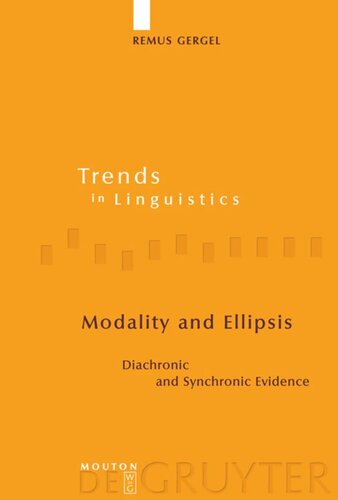

Most ebook files are in PDF format, so you can easily read them using various software such as Foxit Reader or directly on the Google Chrome browser.
Some ebook files are released by publishers in other formats such as .awz, .mobi, .epub, .fb2, etc. You may need to install specific software to read these formats on mobile/PC, such as Calibre.
Please read the tutorial at this link: https://ebookbell.com/faq
We offer FREE conversion to the popular formats you request; however, this may take some time. Therefore, right after payment, please email us, and we will try to provide the service as quickly as possible.
For some exceptional file formats or broken links (if any), please refrain from opening any disputes. Instead, email us first, and we will try to assist within a maximum of 6 hours.
EbookBell Team

0.0
0 reviewsAspects of modality and ellipsis have become prominent in theoretical linguistics over the last years. What has remained under-investigated is the fact that modals tend to make excellent ellipsis licensers and, conversely, that many of the naturally occurring cases of ellipsis are licensed by modals.
The book concentrates on the syntax of the modal auxiliaries with special focus on English and investigates the grammatical relationship with the process of ellipsis that interacts most relevantly with the modals in grammaticalized fashion by including a special emphasis on verb-phrase ellipsis. After a critical discussion of pertinent approaches in the two domains, the book focuses on establishing the connection between the two areas by essentially drawing on the history of English and on observable effects in modern grammars, which it puts into perspective with semantically grounded features on the modals involved.
Two major generalizations are proposed in the monograph.The first generalizationconcerns the treatment of the interaction between modals and ellipsis as determined by the features located in the licensing modal heads. To this end, the syntactic effects of the main semantic factors are explored in detail in English and partial effects obtaining in other languages are discussed. The second generalization concernsthe syntactic component involved in ellipsis licensing. It is suggested that ellipsis types with the distributional features of verb-phrase ellipsis are licensed by interpretable features of the licensing head. The two generalizations are intertwined with one another and derive a series of further legitimate ellipsis licensers beyond the modals. The role of formal features that are interpretable is distinguished from agreement features, which are claimed not to be in charge of ellipsis licensing.